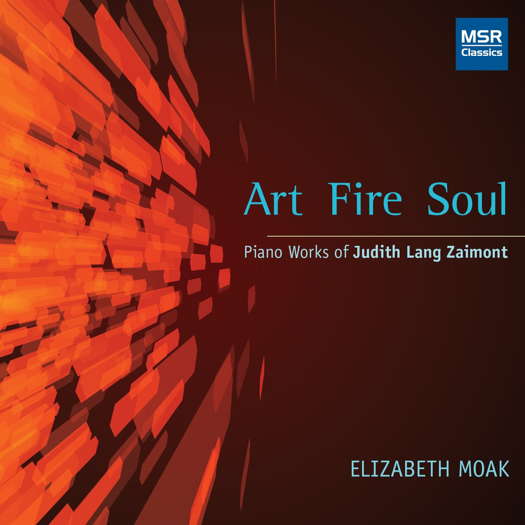 ASK ALICE: Weekly, from 2003 until 2016/17, Alice McVeigh took on the role of classical music's agony aunt to answer questions on a surprising variety of subjects.
ASK ALICE: Weekly, from 2003 until 2016/17, Alice McVeigh took on the role of classical music's agony aunt to answer questions on a surprising variety of subjects.
 VIDEO PODCAST: Come and meet Eric Fraad of Heresy Records, Kenneth Woods, musical director of Colorado MahlerFest and the English Symphony Orchestra and others.
VIDEO PODCAST: Come and meet Eric Fraad of Heresy Records, Kenneth Woods, musical director of Colorado MahlerFest and the English Symphony Orchestra and others.
 SPONSORED: CD Spotlight. An Encyclopedic Recital - Elizabeth Moak plays Judith Lang Zaimont, heard by the late Howard Smith.
SPONSORED: CD Spotlight. An Encyclopedic Recital - Elizabeth Moak plays Judith Lang Zaimont, heard by the late Howard Smith.
All sponsored features >>
WRITE FOR US

Editor KEITH BRAMICH's comments and tips
on contributing to this online magazine,
twenty years on
on contributing to this online magazine,
twenty years on
Having just passed our twentieth anniversary of daily publication and gone live with an all-new online magazine to celebrate, it seems a good time to review the invitation to submit articles. It's always good to receive material from a widening pool of knowledgeable writers. If you think you might like to write for us, even if only occasionally, then please read on.
To set the scene, founding editor Basil Ramsey wrote this in December 1998 for the original Music & Vision magazine's launch on 1 January 1999. Although daily publication is no longer anything particularly special, much of Basil's text still seems relevant, although the current century has arguably already eclipsed the last in terms of turbulence:
New Years usually start with good intentions. This, the final year of perhaps the most turbulent century of all, must surely thunder with intentions, aspirations, prayers and hopes from every living soul. History has proved how Art not only survives periods of unrest but flourishes. Against this backdrop, the launch of a daily music magazine on the internet can seem trite and maybe irrelevant. Nonetheless, we have faith in this unique venture as people everywhere, and from every strata of society, come within the power and influence of good music. In our computer-ridden society the vast resource and potential of cyberspace affects us all. There are many who fear it as a threat - not without some reason - yet it is here, won't go away, and can serve mankind fruitfully as well as foolishly.
Our intention with Music & Vision is to serve this growing interest in serious music. As the internet is unlike any other information provider, the daily electronic issue of a music magazine is feasible and - we feel - desirable as much for the colossal heritage of music worldwide as for the insatiable curiosity of the musically aroused in every part of the globe.
The crucial test for us on the editorial team is provision of acceptable features and the latest news and information. What is effective in a conventional publication format could prove intractable in electronic presentation. So everything is new: to be sampled, evaluated and reshaped until you the reader is satisfied.
Over the coming months we shall bring you topical features, interactive studies of music's development, reviews of live and recorded music, books and printed music, contributions from all kinds of people in music, some frivolity, and ideas that are specifically planned for internet conditions and facilities. We ask your feedback in response and will be grateful for candid comments.
Our fervent desire is to successfully provide assistance in gaining a greater knowledge and understanding of the unique art of music. Such a task is not easy but given a strong platform it can be successful, and certainly enjoyable for us all. - the late Basil Ramsey, December 1998
Here are some points to try to help you if you'd like to write for us:
- Why publish with us? Here are a few reasons: Everything published is professionally proofread to keep the quality high; we serve over 500,000 pages per month; we try to keep an international perspective; and we're well-known in the classical music world, having been in existence for over twenty years.
- Explore our online magazine first. Read features which have been published here recently. See if you like the style.
- Read our privacy policy, and in particular the ... when you contact us and ... when you send material to Classical Music Daily for publication sections.
- An easy way to start. Send in a comment on an already published article. Basil's 'We ask your feedback in response and will be grateful for candid comments' is still as relevant as ever. We publish appropriate comments at the end of articles and features, and sometimes these are suitable for publishing separately, as features in their own right.
- What to write? You might like to discuss a general classical music topic in the news, or to review a book that you've read or a concert that you've attended. Have a look at recently published articles first. This might give you an idea. (Normally we only review CDs and DVDs which have been sent to us by the artists, record companies or distributors, and we send lists of received material to our established writers, so it's usually easier to start with something else.)
- Word length? Anything between 400 and 2,000+ words will be fine. It's worth remembering that shorter articles are easier to write, proofread and edit, and that it's easier to get your point across to our readers when the text is shorter.
- Format? We accept any of the normally used electronic text formats, but our favourite is plain text copied into the body of an email.
- Aim for the highest standard. Please try to check all facts, spellings and grammar before submission. This will make the editorial correction process easier. Allow enough time. When you've finished writing, leave it for a day before reading through and correcting. Submitting too early in the writing process may take several proofs to get your article to publishable standard, delay publication and possibly even annoy the editor.
- Send us something you've written and ask if we'll publish it. Include, separately, a short, publishable biography of yourself, so that we and our readers have some background information about you. It's useful to know whether you've written before, how much you know about and have studied music, whether you're a performer and especially which areas of music you're interested in.
- House style. Don't worry too much about this. We do have a house style, but we can easily adjust your text if you are a new writer. Briefly, though: don't let your sentences get too long. Avoid bold text for emphasis or any other reason. We use single quotes; double quotes are allowed only if inside single quotes. For Dr, Mrs etc and all abbreviations, we don't use trailing full stops. Italics are only used for emphasis, foreign words and phrases, or for works which are proper names - so Haffner Symphony would have italics, but there would be none for Symphony No 35. If you're unsure whether to use italics or quotes, then italics generally look less fussy. Finally, the bit of style that many of our experienced writers get wrong - sentences containing parentheses, commonly known as brackets, should still be grammatically correct if the parentheses are removed.
- After submission. We'll send you a proof - a private link to your text on our www.classicalmusicdaily.com website - and will wait for you to check this and reply before publishing anything.
- Sending corrections. Please don't amend your original article and send it back, unless you can make it clear to us what has changed. It's most useful to have a list of corrections, quoting both the old and new text in each case. It's good to give the paragraph number of any correction you'd like us to make, but not so good to use line numbers within paragraphs - these often change depending on the width of your screen.
- Reviewing. When reviewing material - live performances, recordings and books, for example - never show the subject(s) of the review your text or the proof we send you until your review has been published.
- Quoting from the material under review. This is welcomed, if the extracts illustrate your points, but the extracts need to be kept brief so as not to fall foul of copyright law. For books, please keep quotes to three or four sentences maximum. For live performances, a couple of photos taken at the event can be useful, or photos of some of the artists. You shouldn't need to take these yourself, but it does save us time if you can obtain high resolution photos from the promoter, agent or venue and email them to us. For short samples of CDs and DVDs, you can specify track (or chapter) plus timings, and we will make the sound samples. Please try to specify a minute or less of sound or video, and in any case, no more than a third of the total length of a track.
- Interviewing composers, performers and other artists. This is a special skill. Prepare in advance by finding out as much as you can about the person and his/her areas of expertise. Agree a timescale for the interview. Meet in a quiet place, with no-one else present, if you can. Try to take notes and record the conversation, if the interviewee will allow you to. If possible, just allow them to talk. Beware of putting too much of yourself into the text. As opposed to reviewing, here we'll insist that you show your subject the text before we publish it.
- Concert preview articles. Occasionally we'll publish these, but they're not our favourite type of feature article, because much of the information goes out of date quickly. If you're publicising a concert, please add it to our concert listings first, before considering a preview article.
If you have any questions, please get in touch via the contact us page. We're friendly here, and you'll normally get a quick reply.
London UK


